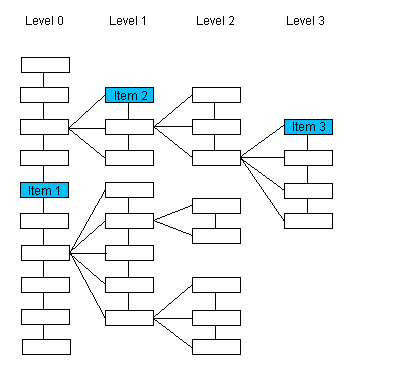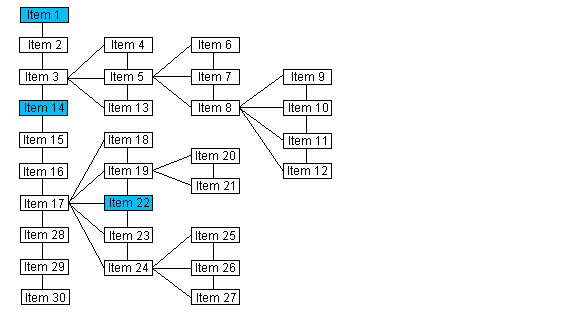
FindFirstElement method (ILEADDicomDS)
|
Overview |
Refer to Working with Data Sets. |
Remarks
Updates the CurrentElement property with the first element in the Data Set that has the specified tag. The search begins with the element specified in the CurrentElement property. The results depend on whether the Data Set is evaluated as a tree or a list.
If the Data Set is evaluated as a tree structure, this method updates the CurrentElement property with the first item on the same level and with the same parent as the element specified in the CurrentElement property, that has tag lTag.
For the sake of these illustrations, the order of siblings is top to bottom. Therefore first is evaluated top to bottom.
Please note that the numbering of the items of interest in this first illustration is arbitrary and does not imply order.

|
If the CurrentElement property contains: |
The CurrentElement property will be updated with: |
|
Item 1 |
The first sibling (same level, same parent) of Item 1 that has tag lTag, if such an item exists. If such an item does not exist, the CurrentElement is updated with NULL. |
|
Item 2 |
The first sibling (same level, same parent) of Item 2 that has tag lTag, if such an item exists. If such an item does not exist, the CurrentElement is updated with NULL. |
|
Item 3 |
The first sibling (same level, same parent) of Item 3 that has tag lTag, if such an item exists. If such an item does not exist, the CurrentElement is updated with NULL. |
If the Data Set is evaluated as a list, this method updates the CurrentElement with the first item in the entire list that has tag lTag. The search begins at the element specified in the CurrentElement property.
For the sake of these illustrations, the order of siblings is top to bottom. Therefore first is evaluated top to bottom.
Please note that the numbering of the items in this illustration does indicate the order of the items when the Data Set is evaluated as a list.

|
If the CurrentElement property contains: |
The CurrentElement property is updated with : |
|
Item 1 |
The first item in the list that has tag lTag, if such an item exists. If an item with tag lTag is not found, the CurrentElement property is updated with NULL. |
|
Item 14 |
The first item in the list that has tag lTag, if such an item exists If an item with tag lTag is not found, the CurrentElement property is updated with NULL. |
|
Item 22 |
The first item in the list that has tag lTag, if such an item exists. If an item with tag lTag is not found, the CurrentElement property is updated with NULL. |
The following methods will also help you find elements in the Data Set with a specific tag:
The following methods will help you find specific modules in the Data Set:
See Also
|
Elements: |
FindFirstElement method, FindPrevElement method, FindNextElement method, FindModule method, FindIndexModule method |
|
Topics: |